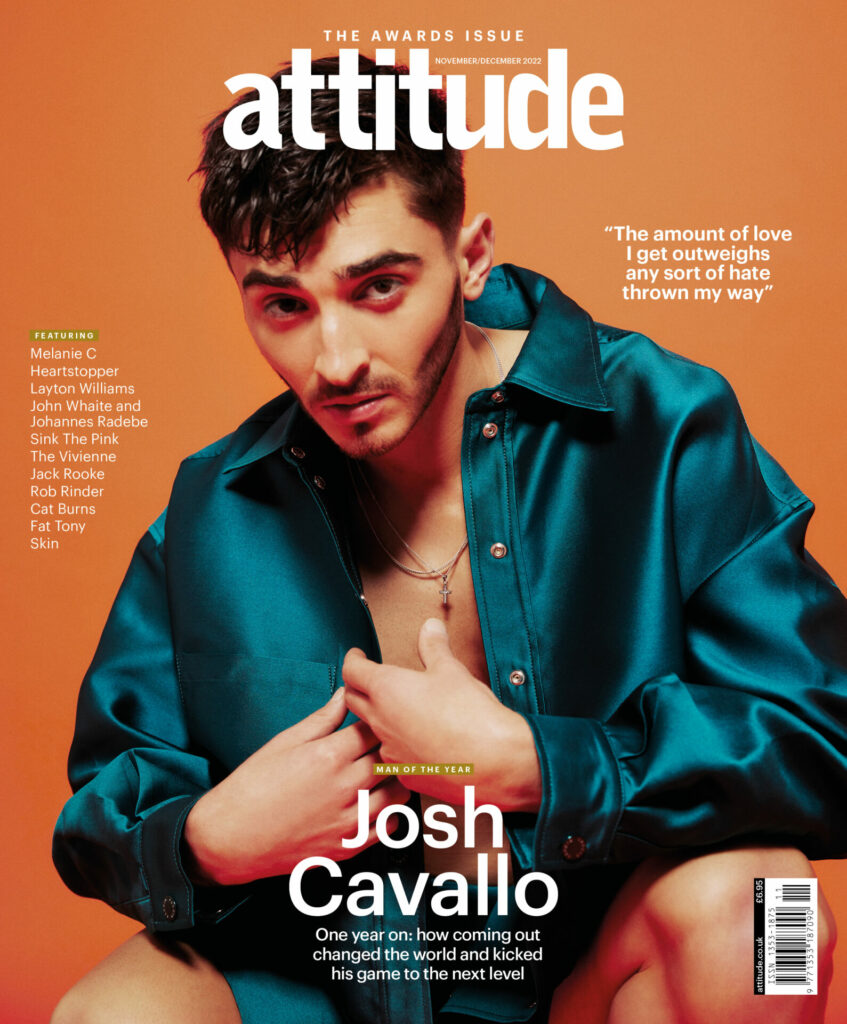How Heartstopper changed the world
There was only ever going to be one winner of the Attitude TV Award this year. Here, breakout star Joe Locke and series creator Alice Oseman help unpack the show's seismic impact.
By Juno Dawson
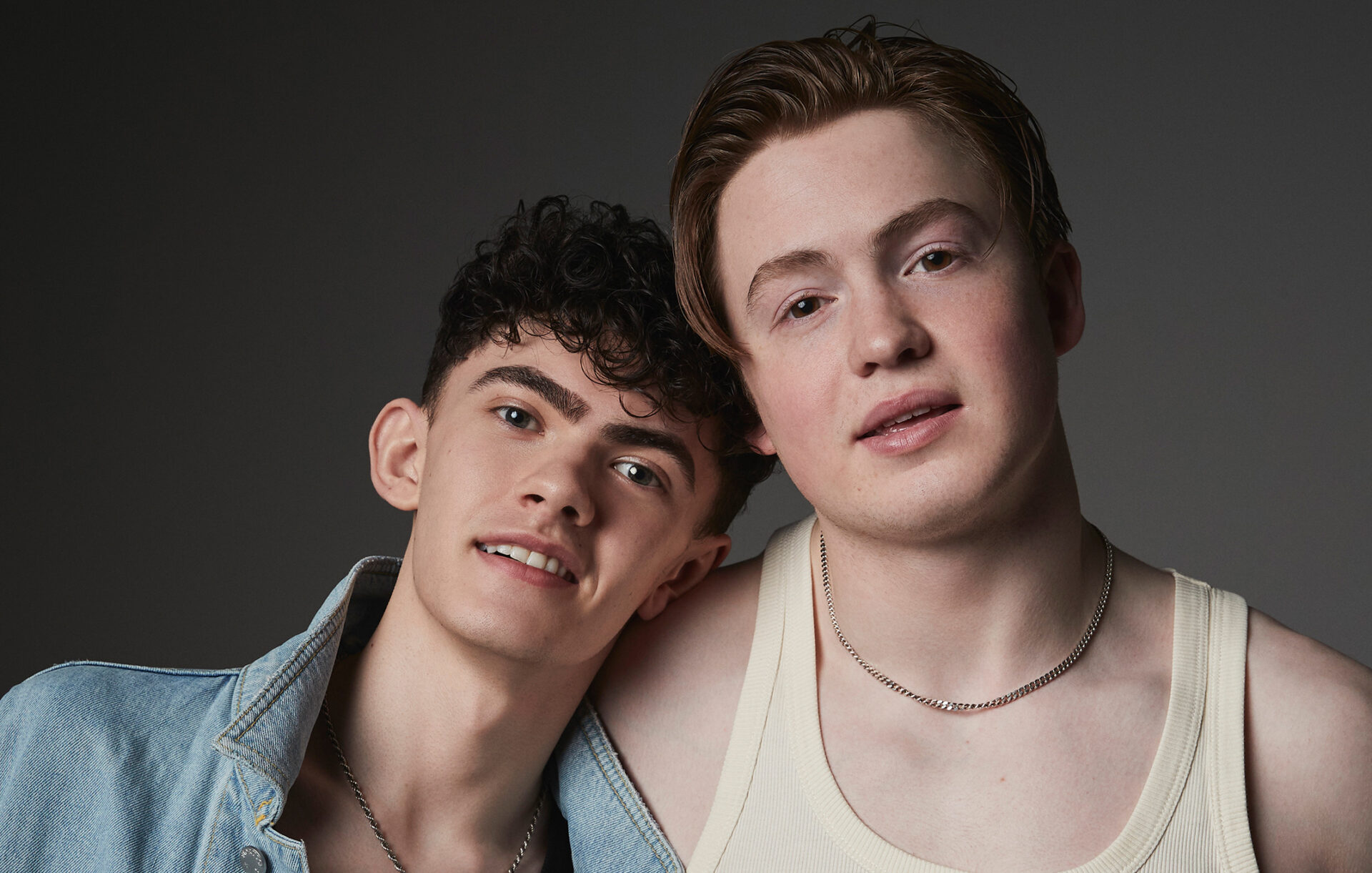
As a UK author of Young Adult fiction, I thought it was game over. Every major book-to-screen smash hit from Love, Simon, to Twilight, to The Hate U Give were quintessentially American. Was it time to throw in the towel? Then, from the humblest of beginnings, came a new teen juggernaut precisely no one saw coming. And it was British. Welcome, Heartstopper.
The Netflix series and winner of this year’s Attitude TV Award is technically the prequel to author Alice Oseman’s debut novel, Solitaire. There, we are introduced to Tori Spring (portrayed on screen by Jenny Walser) and her younger brother, Charlie (Joe Locke), who is going through a mental health crisis.
Sometimes a supporting part develops unexpected Main Character Energy, and Charlie demanded the attention of his creator. Oseman tells me, “I knew that these two characters had an untold story in that novel, and I wanted to dig deeper and understand how their relationship became as strong as it is in Solitaire.”
Oseman therefore decided, in 2016, to chronicle Charlie’s relationship with classmate Nick Nelson in a web comic on Tumblr. “I decided to make it a comic instead because Nick and Charlie’s story felt so episodic, rather than having the traditional beginning-middle-end of a prose novel.”
Originally self-published as a graphic novel via a Kickstarter campaign, Heartstopper caught the attention of producer Patrick Walters at See-Saw Films. Says Walters, “At this point I’d been working in film and television for maybe eight or nine years and if I’m honest that experience had only entrenched a feeling that queer stories were incredibly difficult to get made. The industry thought of them as niche. Reading Heartstopper felt like a lightning bolt. Why hadn’t there been a show like this before? I’d seen so many straight YA romances depicted on screen, but I couldn’t think of a single example of a queer story like it. That realisation became the key to pitching Heartstopper as a TV series. We had to make it because the world needed it.”
With Netflix on board, a global casting call went out to bring Nick, Charlie, et al to life. By the time the casting of the main two characters was announced, it felt like there was already a fanbase salivating at the prospect of seeing these much-beloved characters made real. Although Kit Connor — who plays Nick — had form (His Dark Materials and Rocketman), Locke was still in school on the Isle of Man when he auditioned to play anxious, complex Charlie. Now, with 3.3 million Instagram followers (and counting), the 18-year-old saw his world transformed overnight.
“Heartstopper changed my life in so many ways,” he reveals. “Even before it was released, the experience of creating such a celebratory show with a group of incredible people taught me so much about myself. The unexpected success of the show has given me so much confidence in being who I am, and has completely altered how I look at the world. It’s allowed me to see the good side of the world; if a lovely show like Heartstopper is managing to break into the mainstream in such a dark, turbulent time, there must be some light in the world.”
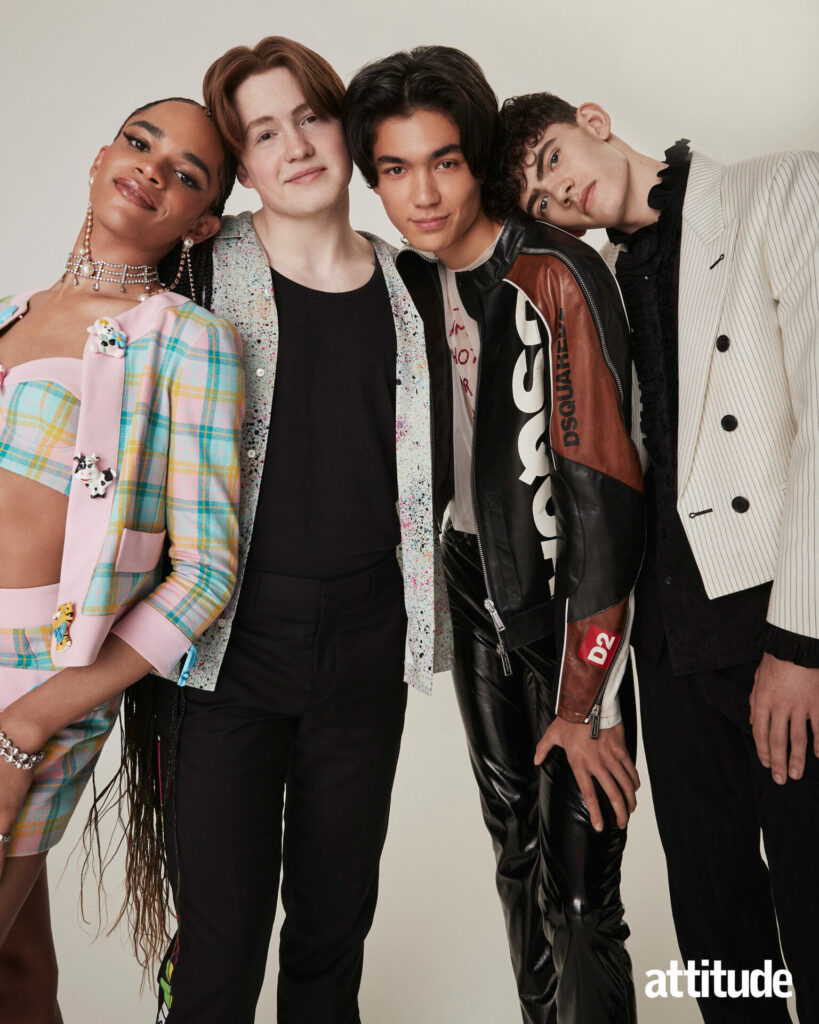
Although he has, for now, taken a step back from Twitter, Locke feels strongly that the cult of Heartstopper is a force for good. “It’s a very weird adjustment to suddenly be in the public eye. People inherently have an opinion of you, but it’s been so nice having the rest of the cast also experiencing the same thing as me at the same time. But most of the ‘attention’ has been so lovely, hearing people’s stories, and meeting the most amazing people on the street. Heartstopper fans are the best.”
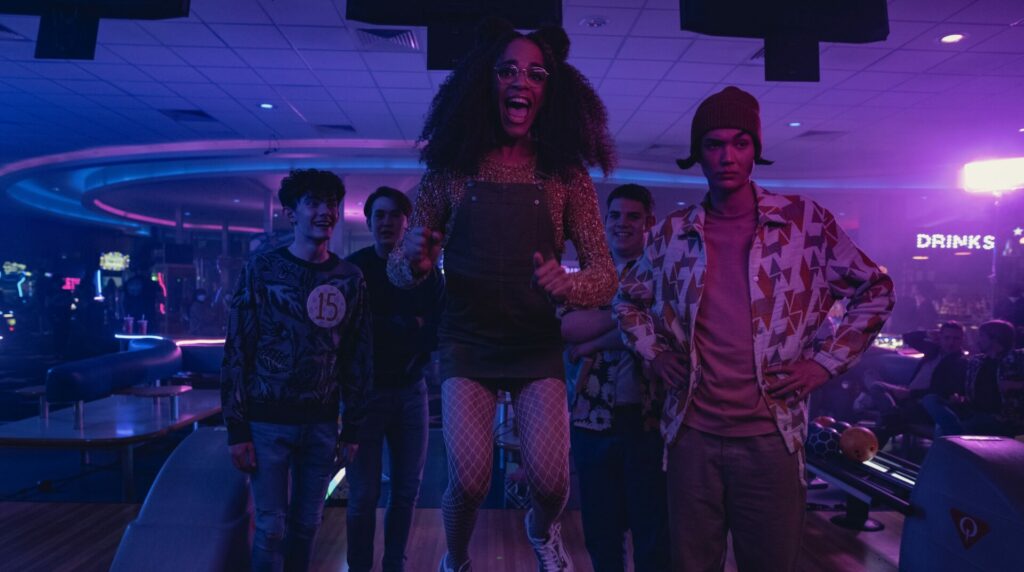
Heartstopper premiered on Netflix in April 2022 to almost unilateral acclaim. The Guardian called it “the loveliest show on TV”. Sales of the graphic novels went through the roof. Notoriously cautious Netflix instantly greenlit a second and third season and there was an undeniable social media ‘moment’. A hit by anyone’s standards, the series garnered 53.46 million hours viewed in its first three weeks, reaching the top ten chart in 54 countries. Two cute queer boys from Kent; global domination.
What was especially intriguing was that the series seemed to appeal far beyond the intended audience of tweens and teens. I spoke to some young fans who told me that the fictional Truham Grammar accurately represents their schooling experience. One 13-year-old told me he loved the show more for its depiction of friendship than its queer representation: “I just like how the friends look out for each other, and how Nick stuck up for Charlie.” A slightly older (19-year-old) fan said, “When I was at high school, people did come out. Not just as gay, but as trans or non-binary, too. I think Heartstopper is quite truthful.”
Some naysayers have noted that Heartstopper is a rather chaste portrayal of teenage boys in the first flush of love, but Queer as Folk (1999), Elité (2018) and It’s A Sin (2021) are also available to stream on Netflix. With queer representation, the answer is always we just need more. One eight-part TV series cannot be everything to everyone. Oseman believes queer joy was the secret behind the show’s big wins. “I think people are drawn to the joy in the story, but also the sense of realism. I always wanted Heartstopper to be full of joy and love, but in a way that feels real and tangible, not dreamlike or unachievable.”
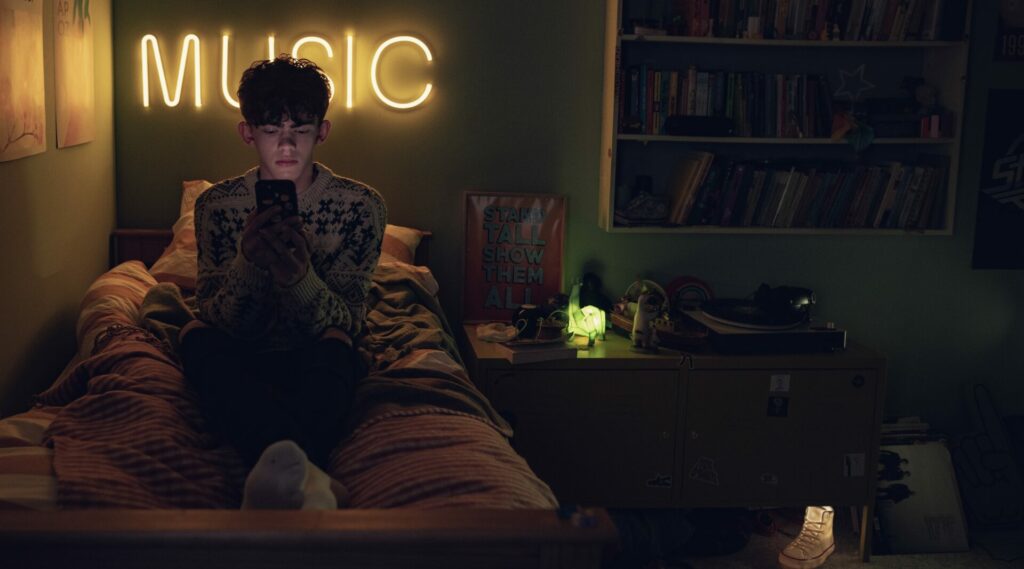
Locke is in agreement: “I think that Heartstopper has broken the trend of queer shows needing to have some traumatic element, and while those shows are so important, so are the Heartstoppers of the world.”
Author and YouTuber Rowan Ellis, who has vlogged extensively about Heartstopper, believes authenticity is key: “The comic is a mix of relatable teen experiences — from mental health struggles to falling out with friends — that treads that careful line between tragedy porn and unrealistic bubblegum sunshine. The show continues this tone — alongside actors who look the same age as the characters — to provide an alternative to more ‘edgy’ teen series.”
And it’s not just on screen. The young actors, savvy in the ways of social media, have harnessed their now-considerable platforms. Ellis explains, “Adding to that, the sense of authenticity that has come from many members of the cast speaking about their own identities and how impactful the roles have been for them, it feels like there is a lot of potential for seeing not only yourself, but your queer friendships in the show, too.”
What was striking was the emotional response the series evoked from adult viewers. I confess I felt the strangest melancholy, almost jealousy, watching these youthful LGBTQ+ characters live with a freedom of expression I was sorely denied in the 90s.
TV critic and fan Scott Bryan agrees: “Heartstopper will always have a special place in my heart because it speaks to the younger version of myself who never saw himself on television, and really needed to. If I had Heartstopper back then, featuring a set of friends who are mostly living their lives and are navigating their relationships and crushes, I would have realised that I was normal and that everything was going to be OK.”
I ask why he thinks Heartstopper has struck a chord in a way that comparable shows such as Love, Victor may not. “Because it serves as a personal letter to our younger selves. And it feels so utterly grounded. Although it can be a difficult watch for the older generation at times because they’ll realise things have changed so much for the younger generation since they were at school, they can take stock in realising that there’s hope now.”
I warn you, if you haven’t read the books, things may be about to get difficult for young Charlie Spring. I have faith, however, that we’re in safe hands with Oseman and Walter. Heartstopper, for me, is a reminder of something I think I forgot along the way: I wanted to be loved, as my authentic self, and that’s the queer representation Heartstopper offers. It’s a powerful, profound thing.
Oseman offers an even more simple explanation of the show’s success: “People love Heartstopper because it makes them happy.”
Check out the cast of Heartstopper’s acceptance speech from the 2022 Virgin Atlantic Attitude Awards below:
Photography Jordan Rossi Styling Joseph Kocharian Yasmin’s hair Silas Maiden; Yasmin’s makeup Emily Wood at A-Frame Agency using Danessa Myricks; Hair and Make up for Joe, Kit, and Will Sven Bayerbach at Carole Hayes using M.A.C. Cosmetics and Bumble And Bumble Grooming Assistant: Vivi Melo Fashion Assistants: Sacha Dance, Bella Azura Dupee
The Attitude Awards issue is out now
